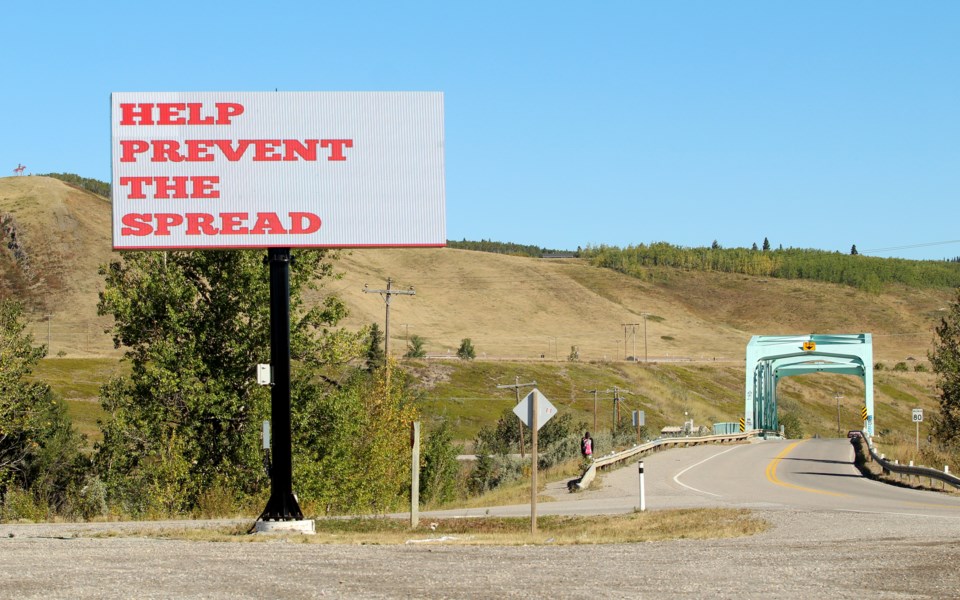MORLEY – COVID-19 case counts continue to rise at Stoney Nakoda First Nation at an alarming rate.
Updated COVID-19 information for Morley posted on Stoney Nakoda’s website indicates 22 new cases were identified on Wednesday (Jan. 13), bringing the total number of active cases to 139. There have been four deaths.
Provincial health officials say they are planning for the next phase of vaccinations, which includes people 65 and over living in First Nation communities or Métis settlements, along with seniors 75 years and older, no matter where they live.
“That planning has been going on for quite some time, but the final details have not yet been sorted though,” said Dr. Deena Hinshaw, Alberta’s chief medical officer of health, during her briefing on Wednesday (Jan. 13).
Hinshaw said there will be more information in the coming weeks about exactly how people in Phase 1B – initially planned to be rolled out in February but will depend on supply – can access the vaccine.
“Some of the factors that are being considered are where there are populations of seniors who may have, for example, mobility issues or access issues,” she said.
“[We’re] wanting to make sure we’re thinking of the mechanism of delivery and the supports that individuals might need to make it as easy as possible for them to access vaccine.”
On Monday (Jan. 11), a state of local emergency was declared for Stoney Nakoda Nation, which includes Morley, Big Horn and Eden Valley due to the “unprecedented increase in COVID-19 positive cases.”
Since March 24, 2020, there have been 278 COVID-19 cases managed by Stoney Nakoda Health Services, with 139 active cases and 139 recovered .
Given the current transmission risk level is considered high, a curfew between the hours of 8 p.m. and 6 a.m. has been mandated, except for work, health, or emergency purposes, and no house-to-house gatherings are allowed.
On-nation funerals and wakes are no longer permitted under the state of local emergency. Virtual funeral services are encouraged, and all remains must go from the funeral home to the burial site.
The state of local emergency calls for a control or ban on travel to and from any designated area including other Nations as deemed necessary to limit the spread of COVID.
“The Stoney Nakoda People will be at high risk of infection causing a potential loss of life, as well as taxing the available local resources,” according to a statement on the Nation’s website.
Tom McMillan, assistant director of communications for Alberta Health, did not answer questions specifically about Stoney Nakoda, but said they are working closely with First Nations and Inuit Health (FNIH) on a vaccine delivery and distribution plan for First Nation communities.
“We are are working with FNIH and communities to support First Nations health-care workers in eligible groups to receive the vaccine,” McMillan wrote in an email.
“As we get more vaccine, we will expand our approach as soon as possible. Remote and isolated First Nations communities, as well as individuals on First Nations reserves age 65 and older, are currently being prioritized in the first sequenced groups in phase 1B.”
Currently, immunizations under Alberta’s phased approach are being offered to respiratory therapists, health-care workers in intensive care units, staff in long-term care and designated supportive living facilities, home-care workers, health-care workers in emergency departments, all residents of long-term care and designated supportive living regardless of age, health-care workers in COVID-19 units, medical and surgical units and operating rooms, paramedics and emergency medical technicians.
As of Jan. 12, 58,144 doses of COVID-19 vaccine have been administered in Alberta. Only 10 adverse events following immunization have been reported to Alberta Health and Alberta Health Services.
Province-wide, there were 12,838 active COVID-19 cases as of Jan. 13, with 875 new cases identified over the previous 24 hours. There are 820 people in hospital including 137 in intensive care units.
In addition, 23 deaths were reported to Alberta Health in the previous 24 hours.
“They ranged in age from 48 to 96 – men and women whose passing leaves a hole in the lives of those who cared about them,” Hinshaw said during her Wednesday briefing.
“I extend my sympathy to each person who is walking through grief right now, no matter the cause.”
There have been 1,368 deaths from COVID-19 throughout Alberta since the pandemic began.




